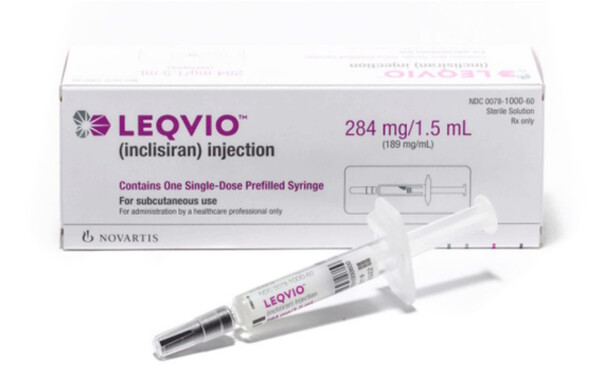Novartis' twice-yearly lipid-lowering subcutaneous injection Leqvio (inclisiran) has passed the Pharmaceutical Reimbursement Evaluation Committee (PREC) on its first challenge.
However, it was decided to rediscuss Ipsen's Bylvay (odevixibat), which was designated an orphan drug by the Ministry of Food and Drug Safety (MFDS), becoming the second treatment reviewed through the simultaneous approval, evaluation, and negotiation pathway.
The Health Insurance Review and Assessment Service (HIRA) held the fourth PREC meeting for 2025 on Thursday and released these and other results.

Leqvio won approval from the MFDS on June 20, 2024, for treating patients with primary hypercholesterolemia (heterozygous familial and non-familial) or mixed dyslipidemia when conventional therapy is insufficient.
The maximum tolerated dose is “in combination with a statin or another lipid-lowering agent (e.g., ezetimibe) in patients with inadequate LDL-cholesterol (LDL-C) control with statins” or “alone or in combination with other lipid-lowering therapies in patients who are statin intolerant or statin contraindicated, HIRA said.
Leqvio is the first lipid-lowering agent to use small interfering RNA (siRNA) technology to lower LDL cholesterol by inhibiting the production of the PCSK9 protein. Unlike previous PCSK9 inhibitors that block the protein, incliciran degrades PCSK9 mRNA to inhibit protein production.
Inclisiran is administered as an initial dose, followed by a dose three months later and then every six months thereafter, allowing patients to achieve sustained LDL-C reduction with only two annual doses. The pivotal ORION-9, ORION-10, and ORION-11 studies demonstrated LDL-C reductions of around 50 percent and a stable profile.
However, Leqvio received a conditional approval. The government deemed the drug eligible for reimbursement at a lower price. If Novartis accepts the condition, the drug will be reimbursed pending price negotiations with the National Health Insurance Service and final approval by the Health Insurance Policy Review Committee of the Ministry of Health and Welfare.
The PREC made the decision to reconsider Bylvay, which was approved through the orphan drug approval, evaluation, and negotiation linkage system.
On Aug. 23, 2024, the MFDS approved Bylvay for treating pruritus in patients with Progressive Familial Intrahepatic Cholestasis (PFIC) aged three months or older.
PFIC is a rare, inherited disorder that affects one in 100,000 people. It is caused by a defect in a protein involved in bile excretion and leads to liver damage, liver cancer, and itching.
By selectively inhibiting IBAT (ileal bile acid transporter), a bile acid transporter in the small intestine, Bylvay blocks the intestinal circulation of bile acids and relieves liver damage and itching caused by bile acid accumulation.
The MFDS designated Bylvay' as a target of the Global Innovative Product Fast Tracking System (GIFT) and approved it quickly through priority review, but the PREC decided that it was necessary to rediscuss the appropriateness of the benefit.
Related articles
- ‘Leqvio offers a new way to attain LDL-C management goals’
- Novartis' Leqvio tackles adherence challenges with simpler treatment for heart patients
- Ipsen’s Cabometyx kidney cancer reimbursement bid collapses in Korea after price talks fail
- After Big Pharma flops, Chong Kun Dang reopens CETP race with US trial
- PCSK9 inhibitors prove effective for ‘ultrahigh-risk’ cardiovascular patients: expert
- Bempedoic acid nears Korean approval for lipid-lowering treatment

